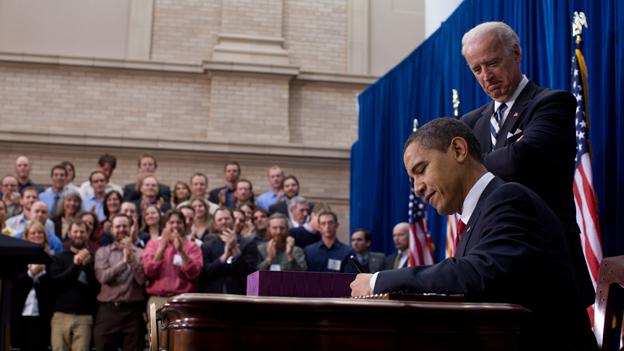
“We have begun the essential work of keeping the American Dream alive in our time. Now, I don’t want to pretend that today marks the end of our economic problems. Nor does it constitute all of what we’re going to have to do to turn our economy around. But today does mark the beginning of the end…The American Recovery and Reinvestment Act that I will sign today — a plan that meets the principles I laid out in January — is the most sweeping economic recovery package in our history.” Back in Denver for the day, President Obama signs the ARRA economic stimulus bill into law. [Remarks.] “‘We have done more in 30 days to advance the cause of health-care reform than this country has done in an entire decade,’ Obama said, prompting a standing ovation.“
As with the initial versions, the final bill passed without a single GOP vote in the House and only three Republicans — Snowe, Collins, Specter — in the Senate. Y’know, it’s bad enough that these situationally-ethical jokers stand in the way of what obviously needs to be done to get our economy moving again. (I don’t remember any calls for spending restraint, or any worries about pork, in the flush times when Boss DeLay was running the show, or when both Reagan and Dubya were ratcheting up the deficit to all hell.) But, it offends the senses to have to listen to the aggressively stupid talking points Republicans tend to trot out these days. For example, the party’s new leader, Michael Steele: “Not in the history of mankind has the government ever created a job.” (The armed services notwithstanding, who does he think the runs the government? Elves? Hey, Mr. Steele, look down — we call those roads.) Or consider South Carolina Sen. Jim DeMint: “This is not a stimulus bill. It’s just a spending bill.” Econ 101: A stimulus bill is a spending bill. (They do in fact teach this in SC — I can attest to it.)
Worse still, the national newsmedia has been failing miserably in their coverage of the stimulus battle, by continually enabling these Republicans to spout their inanities without comment. It reminds me of Paul Begala’s “Neil Armstrong Principle,” which I heard him break down on Charlie Rose a few months back: “If John McCain and Sarah Palin were to say the moon was made of green cheese, we can be certain that Barack Obama and Joe Biden would pounce on it, and point out it’s actually made of rock. And you just know the headline in the paper the next day would read: ‘CANDIDATES CLASH ON LUNAR LANDSCAPE.’” Too true.
Well, at least the durned thing passed. I’m sure the bill has its problems, not the least that it was transformed and watered down in an attempt to placate a bunch of Republicans who were never in a million years going to vote for it anyway. Perhaps, when we move forward now, we can focus on writing good policy that will get this economy and our country moving again, rather than catering to the whims of the naysayers, political opportunists, and/or flat-earth morons that comprise today’s GOP.
